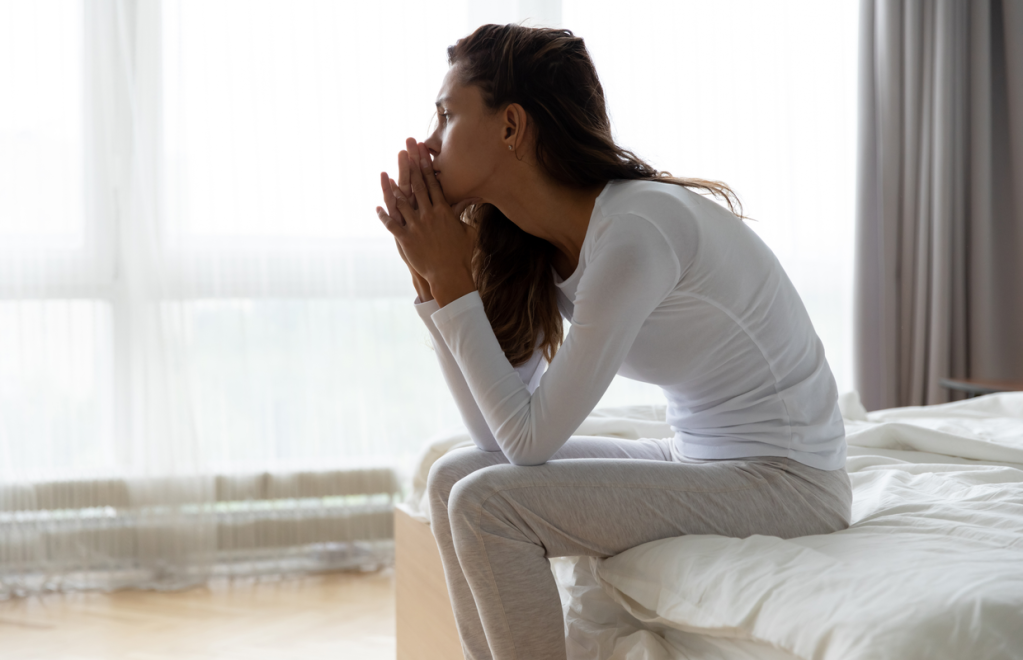Self-care plan: 12 ways to feel better in tough times
Anita Chaudhuri consults experts in the field of self-care for their best strategies to help you feel better and find comfort during tough times.

Let’s face it, most of us could do with cheering up right now. What with pandemics, wars and climate catastrophes – not to mention our own personal troubles – it’s can be hard to stay upbeat and positive. However, according to the self-care experts, there are several simple practices that can help us to navigate the tough times and feel better about our day-to-day lives.
Make small changes to cope during tough times
‘What’s happening right now is a bit like when you’re on a long-haul flight and hit major turbulence,’ says Owen O’Kane, psychotherapist and author of Ten To Zen: Ten Minutes A Day To A Calmer, Happier You (Pan Macmillan, £10.99).
‘In order to get through it, the pilot has to make changes, such as switching altitude or adjusting speed. You have to remain buckled up and probably can’t move around safely like you normally would. My point is that you actually have to plan for how to get through the turbulence in order to deal with it.’
Rather than constantly reaching for treats, which ultimately aren’t going to sustain us for long, he suggests that the best route to finding comfort is to consider what small changes and tweaks we might need to make during challenging times.
‘If you’re going through a tough time, there’s no point in pretending that you can somehow make it great and love the experience. It’s more useful to ask yourself: “How can I make this time more comfortable and enjoyable, trusting in the knowledge that eventually this phase will end.”

Hold onto hope when things are tough
O’Kane grew up during the Troubles in Northern Ireland and was badly bullied at school, so he has lived through some extremely difficult times himself. ‘What we know about human distress is that the more you fight against what is happening, the more you will suffer. What can help is to lean into what you’re experiencing and develop more patience and acceptance of the situation,’ he says.
As a starting point, he advises: ‘Tell yourself: “This isn’t what I would choose right now but I am going to hold onto hope. It’s all about perspective and how you choose to view what’s happening.’ O’Kane believes that the route to comfort starts with hope because when you have a hopeful perspective, anxiety levels drop. ‘Hope boosts your mood and you actually change your brain chemistry, so you feel lighter and more optimistic.’
Plan things to look forward to
The best way to do this is to focus on the future and plan things to look forward to in the short and medium term. ‘From the day-to-day functioning point of view, it just means that you become less entrenched in the negative,’ says O’Kane. ‘You’re in a much more high-functioning state because you’re anticipating something good.’
Of course, treats are not off the agenda, but people often misunderstand self-care as indulgence, says Suzy Reading, author of Self-Care For Tough Times: How To Heal In Times Of Anxiety, Loss And Change (Octopus, £12.99) ‘There’s a difference between self-care and unhealthy crutches,’ she says. ‘A true act of self-care nurtures you in the moment but also nourishes the person that you are becoming. It helps you cope now but also protects the health of your future self.’
Even seemingly benign activities, such as watching copious amounts of TV or late-night Instagram scrolling might not be as soothing as they seem. ‘Bright screens at night could be depleting your sleep,’ says Reading.
‘Without our health, what do we have? That is one of the biggest lessons of the pandemic. Habitually indulging in unhealthy things just to get us through the day – too much caffeine, for example – are actions that will potentially make our tomorrows tougher.’
During tough times, the things that would normally sustain us and help us feel better may be unavailable due to lack of funds, difficult family circumstances or, indeed, a pandemic. When holidays and nights out are off limits, we need to be extra resourceful to come up with a new self-care toolkit. Here are some expert suggestions to help you get started…
12 self-care tips to help you feel better during tough times

1. Make a cosy cocoon
One thing we can all do is learn from the Danish art of cosy living, hygge, to create a comforting corner in our living space. Enhancing your living space is guaranteed to help you feel better during tough times. ‘No matter what your circumstances, take a look around and see where you could create a little more beauty and harmony,’ suggests Reading.
‘Put up fairy lights in a relaxed corner with cushions and blankets. Set mood-boosting focal points around your home using objects such as a piece of driftwood or shells from a special beach. Such objects can provide anchors in stormy times. Instead of seeing a big mess of papers or your children’s Lego, you train your eyes to switch to beauty. Let yourself rest there for a moment.’
Reading also suggests bringing nature into your home by listening to recordings of birdsong, watching a video of cloudscapes or simply allowing a breeze to whisper through your window.
2. Stay grounded during the tough times
When we’re in the thick of it, overthinking is the enemy of feeling good. ‘When you observe a tree during a storm, you will notice that the branches at the top are battered from all directions,’ says O’Kane. ‘I think that’s what it’s like for human beings when we’re in our heads too much.. We are pushed and pulled in all directions by external forces.
‘However, if you look at the base of a tree in a storm, it remains rooted and grounded. It isn’t affected by the storm in the same way. As human beings, it’s part of our responsibility to find our individual sense of inner stability, no matter what storms are going on around us. Whatever is in our mind, whatever other people are doing or saying, we don’t necessarily have to react to them.’

3. Allow yourself a ‘worry window’
It sounds counterintuitive, but it is helpful to schedule time for anxious thoughts. ‘The key is to give yourself full permission to wallow in worry, but make sure you give yourself a container for those feelings,’ advises Reading.
‘We don’t want to immerse ourselves in anxiety all day, every day. But, on the other hand, toxic positivity is dangerous too. We are living through genuinely difficult times and that needs to be acknowledged.’
She suggests making a daily anxiety appointment. ‘You might decide: at 4pm every day I am going to give myself 20 minutes to sit with my concerns, give them a good airing and let myself feel them. Then I will go on with my day. Outside of that time, you can remind yourself that it’s not ‘worry time’ till 4pm. Sometimes, you will get to the appointed time and find that you don’t need it.’
4. Rescript your self-talk to be less critical
Self-compassion is a buzz word but understanding how to apply it isn’t always obvious. O’Kane says that one constant he has observed is that people give themselves a terribly hard time. ‘When I hear people talking about their lives, they tend to beat themselves up and are super critical of themselves. Learn to talk to yourself with kindness and you will notice you feel better.
‘I ask my clients: “Would you talk to another human being the way you talk to yourself?” Every one of them says no, because their internal tone is so harsh and judgmental.’ By becoming conscious of your inner dialogue, you will automatically be comforted.
‘Everything feels easier because you no longer have this enemy inside criticising you. Instead, you’ve got an ally. Start by paying attention to your inner talk for an hour. What are you saying? How do you value and prioritise yourself? It’s not a luxury item, it’s essential maintenance and a true foundation to keep you functioning well – especially during tough times.’

5. Curate happy memories to feel better during tough times
‘Simple things can be so powerful,’ says Reading. ‘If we associate self-care with extravagant spa trips and luxury products, we will only do it once in a while – but if we put photos of happy times around the house, they foster a feeling of tenderness towards ourselves, awakening our capacity for self-soothing, giving us permission to feel.’
Reading has a trio of photos in her kitchen that are reminders of her beloved Australian landscape and upbringing. ‘The beauty is that these memories can have cumulative power. You might well think “what good is that going to do?” but if you dot moments of feeling and connection throughout your day, they will help release tension and cultivate a more constructive mindset.’
6. Make daily time for you
If you want to feel better, start by learning to take time out of your day just for you, suggests O’Kane. ‘The human brain is an organ and, like every other organ, it needs time to rest and recharge, and it needs time to process. If we’re on the go constantly, it will start to deplete and not function as well.’
He advocates taking 10 minutes a day to create time and space to simply be with yourself in whatever way works best for you. Finding this space will be different for everyone, depending on your preferences and where you are based. If you’re in a busy office, the only place might be a quiet toilet cubicle or in your car at lunchtime!
‘If many things are bothering you during tough times, pick one. Make it an issue that is within your control and let it be your focus. It will give you a greater sense of control than if you’re trying to micromanage the future of the global economy!’

7. Remember that self-care is important
Self-care often gets overlooked because we deem it selfish or self-indulgent. ‘Spend time reflecting on what self-nourishment facilitates in your life,’ says Reading.
‘What does it allow you to do and be? What does it cost you not to do it? How does that affect the quality of your choices and the health of your relationships? The answers to those questions will form the basis of your personal why. It’s a useful reminder that we’re not actually transgressing our moral code when we choose to take care of ourselves.’
8. Slow down and ‘potter’ to feel better during tough times
Doing your own thing in your own time – also known as ‘pottering’ – has emotional value and can help you to feel better during tough times, says expert Anna McGovern. Anna defines ‘pottering’ as: ‘To occupy oneself in a pleasant way but without a definite plan or purpose. “Pleasant” implies comfort. “Without a definite plan or purpose” implies freedom.’
After a traumatic period caring for her father and family while working full-time, McGovern decided to make a few life changes. ‘When things got calmer, I decided to take a day a week for myself. I started to say no to other people. I didn’t say it forcefully, I simply withdrew my effort from some things. It gave me such solace, having no one to interfere with my time.’
McGovern didn’t know it but she was creating a manifesto for pottering, which resulted in her book, Pottering: A Cure For Modern Life (Laurence King, £12.99). ‘I sorted out the cupboards, I wandered to the shops, I faffed around in my kitchen listening to the radio. In the book, I have tried to deconstruct the characteristics of pottering, but there aren’t many rules. One is that watching a box set isn’t pottering.’
Pottering, she explains, requires some form of gentle movement. ‘You are choosing to do something satisfying and useful, though sometimes the activity is slightly unnecessary. It’s satisfying because it gives you the illusion of control.’ Ideal pottering includes rummaging in drawers, rearranging ornaments and clearing out your pantry.

9. Remind yourself that these tough times will pass
‘Start by reminding yourself that when we go through tough times, there’s a real danger that we start to see it as a forever state,’ says psychotherapist and author Owen O’Kane. ‘Remind yourself that whatever you’re going through is a temporary period of time. It can help to read or watch narratives from history to put what you’re going through into perspective.’
10. Avoid falling into victimhood
O’Kane explains: ‘Every human being has choices about how they can move their life forward. Remember that you can choose to take responsibility for your own happiness. One of the most important things you can do is focus on your wellbeing and make it a priority. There’s no point in waiting for someone else to make you feel better, sometimes you have to make it happen for yourself.’
11. Learn how to tolerate difficult emotions
If you struggle to process difficult emotions during tough times, O’Kane offers the following advice: ‘I know I don’t respond well when I feel that someone is undermining me. For example, I have to be really conscious when I’m in a meeting and I feel as if someone is talking down to me – so I don’t over-react.
‘Most people struggle with how they deal with unpleasant feelings, such as anger, dread or anxiety, whatever the context. The tendency is to run from the situation that triggered the emotions or try and block them out. Instead, let the emotion be a guide. What is the feeling trying to tell you? Once you get in tune with the feelings, they can lead you back to your point of stability.’

12. Make time for exercise to feel better during tough times
We’re constantly hearing that exercise is good for our mental well-being, and the self-care experts agree – especially when you’re exercising outside. ‘Getting fresh air increases dopamine and oxytocin and these are essential for effective self-care,’ explains O’Kane.
‘Walk, run or swim. Participate in any form of movement that’s possible for you. Why not make the most of the nature that’s available to you by going for a walk in the park?’









